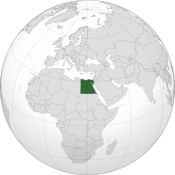Mubarak refused permission to leave Egypt for treatment after heart attack
Tuesday, April 12, 2011
Ousted Egyptian president Hosni Mubarak has been refused permission to leave the country for medical treatment in Germany after suffering a heart attack during questioning by prosecutors who allege he was involved in corruption and killings while in government. The former leader was transported to hospital this afternoon days after he defended himself against allegations of money laundering.

Image: Ricardo Stuckert.
Mubarak, who is banned from leaving Egypt, was today taken to hospital in the coastal city of Sharm el-Sheikh, where he has been living since being ousted from power following widespread protests across the country, a security source confirmed. It is understood aides have requested he be allowed to leave the country for Germany, where he underwent surgery on his gall bladder last year. Officials close to Mubarak have repeatedly insisted recent reports that the former leader's health was deteriorating were false.
The hospital is reported to have effectively shut down since Mubarak's admission today, and is only accepting emergencies, although Wikinews cannot independently verify this report. The security source said Mubarak was taken to hospital "amid a very heavy security presence in the town" this afternoon after maintaining a low profile in the city, on the coast with the Red Sea. He arrived at the hospital in his armored Mercedes, flanked by heavy police protection, according to two doctors who spoke anonymously. Hearing the news of the hospitalization a number of protesters arrived at the hospital to picket against the former president. The hospital declined to make any comment on the news, and said the Egyptian minister of health would make a statement later today.
Mubarak was being questioned by Egyptian officials, who summoned him for interrogation at the weekend, when he was taken to hospital. Prosecutors allege he ordered security forces to fire on people protesting against his rule. In an audio interview broadcast on television station Al-Arabiya, he said he would robustly defend himself against what he termed an "unjust" campaign of "distortions, lies and incitement" against him. He claimed his enemies were systematically aiming to "tarnish my reputation and discredit my integrity," and said he would legally fight those who "engaged in lies and distortions against me."
Related articles
- "Mubarak summoned by Egyptian prosecutors to face allegations of killings and corruption" — Wikinews, April 10, 2011
- "Mubarak arrested in Egypt ahead of corruption probe" — Wikinews, April 13, 2011
Sources
- "Mubarak has heart attack during questioning" — The Australian, April 12, 2011
- Ashraf Sweilam. "Former Egyptian President Mubarak hospitalized" — Yahoo! News, April 12, 2011
- "Egypt's Hosni Mubarak taken to hospital" — BBC News Online, April 12, 2011
- "Mubarak 'hospitalised in Sharm el-Sheikh'" — Agence France-Presse, April 12, 2011

